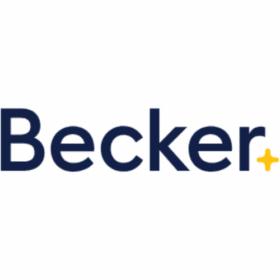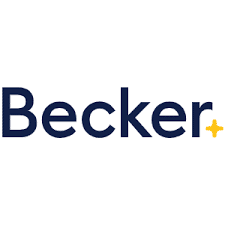The CPA exam schedule is pretty confusing because there are so many different testing windows, exam dates, blackout months, and other oddities. This means that the scheduling process can be difficult to figure out for first-time candidates.
But it doesn’t have to be. Here is some “must-know” info about the CPA exam scheduling, with tips from both experts and past CPA exam candidates.
How to Schedule the CPA Exam
The first step in understanding how to sit for the Uniform CPA Examination is figuring out the scheduling process.
After your CPA application has been approved by your state board of accountancy, you will be notified that you are eligible to sit for the exam with an Authorization to Test (ATT). Basically, this document typically gives you 90 days to pick which section of the exam you want to sit for. Once you decide which section or sections you want to sit for, you can register for them and pay the applicable fees on the NASBA website.
- 1.Becker CPA Review Course: Rated the #1 Best CPA Review Course of 2026
- 2.Surgent CPA Prep Course: Best Technology
- 3.Gleim CPA Review Course: Largest Question Bank
CPA Exam Notice to Schedule (NTS)
About 3 to 6 weeks after you pay your registration fees for the CPA exam parts you signed up for, you’ll receive your Notice to Schedule (NTS) for those sections. This is the document that legally allows you to sit for a section of the CPA exam in the United States.
After you receive this document, you will be able to schedule a testing date and time with a Prometric testing center. Be aware! Without this document, you will not be able to schedule a testing date. Also, your NTS is only valid for 6 months. Hence, if you don’t schedule your exam within that window, your NTS will be invalidated, and you will be required to pay the same exam fees in order to get another one.
“Check the availability at your local testing center to see how far they are booking out to help make your decision. If they don’t have a single appointment available for 8 weeks you might want to go ahead and schedule unless you want to be constantly refreshing Prometric in hopes of someone cancelling last minute.” – Reddit User on a thread about CPA exam scheduling
CPA Exam Testing Dates
Testing windows are the CPA semester dates that candidates can schedule and sit for the exam. Typically, these windows include the first two months of each quarter and follow this pattern: two months of testing followed by one month of no testing. Thus, January – February, April – May, July – August, and October – November are testing months that are available for candidates to schedule exams.
2024 CPA Core Section Test Dates
1st quarter: January 10 to March 26, 2024
2nd quarter: April 1 to June 25, 2024
3rd quarter: July 1 to September 25, 2024
4th quarter: October 1 to December 26, 2024
CPA Discipline Section Test Dates:
1st quarter: January 10 to February 6, 2024
2nd quarter: April 20 to May 19, 2024
3rd quarter: July 1 to July 31, 2024
4th quarter: October 1 to October 31, 2024
CPA candidates can typically make an appointment for a specific date and time six days per week during any testing window at their local Prometric testing center. However, one important note to consider is that you are not able to schedule to sit for the same section multiple times in the same testing window.
If you fail a section in January, you will not be able to take it again in February. Consequently, you will have to wait until March to retake it again.
“Just remember that depending on state and location, exams are booked weeks ahead. You can’t just decide to take the exam the same week or the week after because there will be no appointments available.” – Reddit User
CPA Blackout Months
There are blackout dates that Prometric does not offer testing for the CPA exam. Based on the provided 2024 CPA Exam schedule, the blackout dates—when the CPA Exam is not offered—are as follows:
For the CPA Core Section Test Dates:
- 1st quarter blackout dates: March 27 to March 31, 2024
- 2nd quarter blackout dates: June 26 to June 30, 2024
- 3rd quarter blackout dates: September 26 to September 30, 2024
- 4th quarter blackout dates: December 27 to December 31, 2024
For the CPA Discipline Section Test Dates, the blackout periods are more extended due to the specific testing windows for each quarter:
- 1st quarter blackout dates: February 7 to April 19, 2024, and March 27 to March 31, 2024 (considering the core section blackout)
- 2nd quarter blackout dates: May 20 to June 30, 2024
- 3rd quarter blackout dates: August 1 to September 30, 2024
- 4th quarter blackout dates: November 1 to December 31, 2024
These blackout dates are the periods during which CPA candidates cannot schedule their exams for either the core sections or the discipline-specific sections.
18 to 30-Month Rolling Window
The National Association of State Boards of Accountancy (NASBA) has proposed extending the time to complete all four sections of the CPA Exam from 18 months to 30 months, a change already adopted by several states. This recommendation aims to offer CPA candidates more flexibility amidst their preparation challenges.
The original 18-month window, now potentially 30 months in some areas, is not about scheduling exam dates but completing the exam’s four sections. Once you pass the first section, you have 18 to 30 months to pass the remaining three. Failure to do so means the initial passed section’s credit expires, necessitating a retake. For instance, if you pass the FAR section in January of Year 1 but don’t pass the other sections until October of Year 2, your FAR result would be invalidated.
This move towards a 30-month window reflects an understanding of candidates’ varied commitments and the need for greater exam preparation flexibility.
“There are two extensions: 1. The CPA evolution that any credit that expires after 1/1/2024 will now expire on 6/30/2025. This one is approved by a lot of states. 2. The 30-month window for testing. I think this is based on the exam date and adding 30 months to that. This has not been approved by most states yet…” Reddit thread
CPA Exam Costs and Fees
There are a variety of costs and fees associated with sitting for the CPA exam. Here’s a list of the fees and what you can expect to pay.
There are a couple of things to understand about these fees. First, the application fee is only a one-time cost that varies by state. This is the fee you pay to your state board for your initial application. Therefore, once you’re approved to take the exam, you don’t have to pay this again.
Second, the NASBA fee is the cost of taking the exam. You pay this every time you sign up for a section. Currently, this fee is $75 per exam section but is subject to change. Keep in mind that you don’t pay this fee when you sit for the exam. Instead, you pay it when you sign up. Thus, if your NTS expires, you will have to pay this fee again for the same section.
Then there is the cost of taking each exam section. In the past, this varied by section, with some costing more than others. Currently, each section has a flat rate ranging from $250 for some states to $385 for others. For CPA candidates and most states, the fee is $344.80 per exam section.
If you are in a state that requires you to take the AICPA ethics course and exam, which ranges between $250 and $320 depending on whether you are an AICPA member. Some states don’t require an ethics exam at all, while others, like Arkansas and California, offer an alternative. Ultimately, it just depends on where you’re applying.
Finally, the CPA licensure fee varies drastically between states. Hence, you should check with your state board to see what your initial and annual fees will be to maintain your license.
Get Discounts On CPA Review Courses!

Take $1,600 Off UWorld CPA Elite-Unlimited Course

Take $1,346 Off Becker CPA Pro+

Enjoy $1,345 Off Becker CPA Pro

Save $1,249 On Gleim CPA Traditional

Enjoy $1,050 Off Gleim CPA Premium Pro Course

Score $1,000 Off Becker CPA Concierge

Save $629 Surgent CPA Ultimate Pass

Exclusive Offer – 30% Off Lambers CPA Course Package

Becker Deal: Save on CPA Single Part Courses

Enjoy a 14-day Free Trial on Becker CPA Courses

Becker CPA Advantage Package Now $2,499 – Promo

Becker CPA: Interest-Free Payment Plan – Deal

Get CPA Evolution Ready Content on All Becker CPA Courses – Deal

Take 40% Off Gleim CPA Premium
CPA Exam Sections
Before you go and pay NASBA a bunch of fees to get your NTS, you should stop and figure out what part you want to sit for. The three core parts of the examination are:
- Auditing & Attestation
- Financial Accounting & Reporting (business enterprises, not-for-profit organizations, and governmental entities)
- Regulation (professional responsibilities, business law, and taxation)
Each of the parts of the examination is graded on a scale of 0 to 100. The minimum passing score is 75. Each part tests candidates on different topics and areas of study. They all consist of the same basic format: multiple-choice questions and task-based simulations.
FAR Section
Financial Accounting and Reporting (FAR) is the longest section of the exam and tests candidates on the following financial accounting and reporting topics:.
- 17-23% concepts
- 27-33% accounts and disclosures
- 27-33% transactions
- 8-12% governmental
- 8-12% not-for-profits
AUD Section
Audit (AUD) tests candidates on the following auditing topics:.
- 12-16% engagement acceptance and planning
- 16-20% entity and internal control
- 16-20% procedures and evidence
- 16-20% reports
- 12-16% accounting and review services
- 16-20% professional responsibilities
REG Section
Regulation (REG) is the section of the exam that has the least to do with financial accounting. This section mainly tests the following business law, individual taxation, corporate taxation, and business structure topics:.
- 15-19% ethical and legal responsibilities
- 17-21% business law
- 11-15% federal tax process
- 12-16% gain and loss taxation
- 13-19% individual tax
- 18-24% taxation of entities
What Order Should You Sit For the CPA Exam?
There are a lot of different theories about this. However, I always suggest candidates sit in their strongest sections first. I talk more about which CPA exam you should take first in this blog post. I also suggest the best order to take each section in this post. Before you worry about what section you are going to take first, you will need to pick out a CPA prep course.












